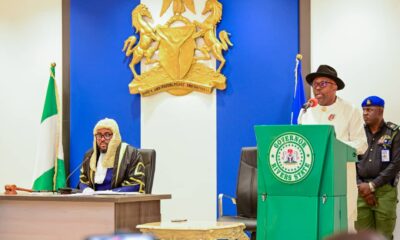Oil & Energy
Towards Stable Electricity Supply In Rivers
The Rivers State Government recently reaffirmed its commitment to ensuring stable and constant electricity in the State.
The State Governor, Rt. Hon. Chibuike Rotimi Amaechi who disclosed this at the Inter-denominational church service to mark this year’s Armed Forces Remembrance Day assured that citizens of the State would by December this year enjoy stable and constant electricity.
Acknowledging the challenges facing the people of the state, the governor said he would tackle them promptly, adding “Government is fully aware of its commitment to the people who elected me into office”. He reaffirmed that plans were on-going to provide stable and constant electricity in the state by December 2012.
To further reaffirm this commitment, the government signed a Memorandum of Understanding (MoU) with Shell Nigeria Gas, a subsidiary of the Shell Petroleum Development Company (SPDC) for the development and distribution of natural gas within Port Harcourt and its environs. A similar agreement was also signed with Oando Gas and Power on the same issue as its determination to reposition the state in the development of the gas sector as well as help in improving the power plans of the state government.
The MoU represents a key step in not only the gas masterplan implementation but will also put the state reputation as the energy hub of the country and improve the socio-economic benefits of the state. This can only be possible if the parties keep to the agreements. The MOU covers a period of thirty years.
Rivers State is a major oil and gas province in the Sub-Saharan Africa with more than 40 percent of Nigeria’s crude oil reserves and 55 percent of natural gas reserves located in the state. Many key players in the Nigerian Petroleum and natural gas industry have their regional offices in Port Harcourt, the capital of the state.
However, despite the more than 50 years of active operation in the state, there is very little synergy between the oil and gas industry and the local economy, particularly with respect to power distribution and transmission, and effective participation of indigeneous entrepreneurs.
The on-going efforts by the Rivers State government at repositioning the power sector would boost electricity supply in the state and take the state to a greater heights in our pursuit of making electricity safe, reliable and affordable. There is currently an increase in electricity generation in the state but that would not solve the problem until there is a corresponding increase in distribution.
The vision of the present administration in the State is to transform the economy through efficient use of energy resources as well as to position Port Harcourt as the Energy capital of the West African Sub-Region and the Gulf of Guinea. The use of gas resources to power electricity in Rivers State will enable its people get the benefits of the resources of their land.
One very important aim of the state government from the time past has been to develop its gas turbine into one of the leading Independent Power Project (IPP) in the country and the government had continued to offer a wide range of solutions to the problem of power shortage for which several feasibility studies and plans have been done. The government has continously placed priority on the development of the power sector in the state, hence the Omoku gas turbine, Trans-Amadi and Eleme gas turbines had undergone processes of power distribution and transmission, yet their aims are not fully achieved, though the state power station at Oyigbo (Afam) is giving a boost to the power project of the state.
The government of Amaechi believes in serving as a reference for excellence, this, he wants to show in the power supply as he did in the social responsibility. The governor’s reassurance to fulfil his promise of providing adequate electricity to the entire state before the end of his tenure, no doubt, must be backed with action.
At a meeting with Chiefs, elders, youths, women and opinion leaders of communities whose lands would be acquired for the construction of the planned 33/11/KV injection Sub-Stations and Rows for transmission lines, the state Commissioner for Power, Hon. Augustine Wokocha reiterated that government was committed to providing a stable and an affordable electricity supply in the state.
He advised communities against unnecessary interruption that would impede the course of the surveyors and valuers, stating the resolve of government to complete its projects in record time. “Communities should cooperate with surveyors and valuers as well as the contractors that would handle the projects to enable them carry out power work that would be beneficial to both the government and the communities”, he stressed.
Port Harcourt is a very comfortable investment zone and the state continues to make its mark and contribution towards sustainable power production and distribution. It is hoped that the government will establish an Independent Power Project (IPP) that will power the business sector in the state and have other things that will enable the state have independent power plants in the strategic areas. It is also hoped that the state would work with the Federal Government plans to privatize the power sector, bearing in mind that power is still in the exclusive list.
The government has so many things to put in place before it can go into the Independent Power Project which President Goodluck Jonathan is trying to do in the reodmap on power sector reform. The Federal Government’s gas-to-power initiative, the passing into law of the Nigerian Local Content Bill and other initiatives by the Rivers State government from its Petroleum and Natural gas resources would provide the necessary enabling materials for the achievement of stable and constant electricity supply to the state.
With the Federal Government’s intention to ensure that oil companies end gas flaring by December this year, it is expected that the Rivers State government would key into the programme to make energy-driven economy for the state as it will attract investment opportunities and create jobs for the people in the power and industrial sectors.
The Nigerian Electricity Regulatory Commission (NERC) has put in place necessary mechanism in order to have an acceptable platform for the proposed electricity tariff review and already collating materials to work with, with a view to issuing a new cost of electricity in the country. This will usher in a subsidised cost of electricity for ordinary Nigerians who may not be able to afford the proposed increase in tarrif, especially those in the rural areas and others. More than 40 per cent of the electricity in the country are generated privately for greater efficiency.
This calls for the Federal Government to reduce import taxes paid on components used for producing power equipment. Such reduction of import duties would encourage investors and governments in the country to produce more power to improve the supply situation, create jobs and wealth for the country. Regular and efficient power supply remains the only infrastructure that is required to install the full entrepreneurial energies of the state and nation’s economy, and unleash unprecedented economic growth.
The Rivers State government’s focus is to make progress in optimizing its gas for distribution to power industries and key into the President’s gas-to-power framework or masterplan. The power sector in the state, in the third quarter of last year showed good signs of improvement which began after the turn-around maintenance and upgrading of the electricity supply and distribution by the State government in conjunction with the Power Holding Company of Nigeria (PHCN) in the State. Residents of Port Harcourt and the state are concerned about whether the tempo can be sustained to end the blackouts suffered in recent past. Thanks to the Amaechi government because the situation which was described as failure and epileptic has resurrected with unending power supply chain-transmission, distribution and generation.
In the electricity business, if any section of the chain is insufficient or works at sub-optiomal level as a result of poor equipment or operation, it would affect other sections, so the state government in its commitment to providing electricity for the people overhauled the entire supply chain of the power sector in the state, which is currently paying off. Rivers people and residents of Port Harcourt and its environs are now enjoying improved power supply and it is hoped that by the end of this year and with the plans underway, there will be substantial increase in power generation in the state, even with the envisaged growth in gas supply next year.
The current development exemplifies the government’s seriousness in ensuring stable and constant electricity by December this year and also underscores the government’s capability in managing the complex synergies in the power sector reform which seems to task more responsibilities to the PHCN. Seven years after the Power Sector reform Act 2005, we ought to have moved to the point of counting our gains of the reform as against the benefits lost. In the light of emerging realities, there is a lot more that needs to be done to secure an anchor to the reforms which are proving unworkable.
It will be a worthwhile experience for Rivers people to have a telling reference of the improvement or stability in power supply in the State from the Governor Amaechi-led administration. The State Power Station in Afam which is off-grid is on course and it is giving what the metropolis wants and enabling the state deliver services that are so critical to the welfare of the people.
The governor has thought reasonably by trying to replicate the model in his state. What the nation needs at this time are scores of compact micro-schemes to deliver power off-grid to take the wind out of the sail of the inept PHCN.
Shedie Okpara
Oil & Energy
Bill Prohibiting Gas Flaring Passes 2nd Reading

The Bill for an act to prohibit gas flaring, encourage commodity utilisation, and provide for penalties and remedies for gas flaring violations has passed its second reading in the House of Representatives.
Sponsored by the Member representing Ikorodu Federal Constituency (APC, Lagos), Babajimi Adegoke Benson, the bill seeks to prohibit the flaring and venting of natural gas, except in strictly regulated circumstances, while encouraging the utilisation of gas resources to foster economic growth and energy generation.
The proposed legislation aims to mitigate the environmental, health, and economic impacts of gas flaring, aligning Nigeria’s oil and gas operations with international climate change commitments.
Offenders, who violate the provisions of the proposed law, would face stringent penalties, including fines of $5 per 1,000 standard cubic feet of gas flared and potential suspension of operations for repeat violations.
Leading debate on the general principles of the bill, Benson said gas flaring has plagued Nigeria for decades, resulting to severe environmental degradation, public health crises, and economic losses while it environmentally, contributes to greenhouse gas emissions, global warming, and acid rain, exacerbating climate challenges.
The lawmaker said public health impacts of the practice are equally dire, as pollutants from gas flaring cause respiratory and cardiovascular diseases, particularly among residents of communities close to flaring sites.
According to him, economically, flaring results in the waste of a valuable resource that could otherwise be harnessed for energy generation or exported to generate revenue.
Benson insisted that the bill was designed to address those issues while bringing Nigeria in line with global standards such as the Paris Agreement on climate change.
“The bill provides for a comprehensive prohibition of gas flaring except in emergencies or when explicitly authorised by the Nigerian Upstream Petroleum Regulatory Commission (NUPRC).
“Operators are required to submit and implement Gas Utilisation Plans, detailing how gas that would otherwise be flared will be captured, processed, or commercialised.
“Offenders, who violate these provisions, face stringent penalties, including fines of $5 per 1,000 standard cubic feet of gas flared and potential suspension of operations for repeat violations. Furthermore, the Bill ensures that communities affected by gas flaring are entitled to compensation and environmental restoration, creating a mechanism for redress.
“Transparency and accountability are integral to the enforcement framework of this Bill. Operators must submit regular reports on gas flaring incidents, which will be audited and made publicly available by the NUPRC. This approach ensures public oversight and stakeholder engagement, fostering trust and compliance.
“Nigeria’s adoption of this Bill positions the country to emulate such success, ensuring a balance between environmental stewardship and economic development.
“The implementation of this Bill will be overseen by the Nigerian Upstream Petroleum Regulatory Commission, which will monitor compliance through regular audits, enforce penalties, and facilitate gas utilisation projects in collaboration with operators and development partners.
“The Anti-Gas Flaring (Prohibition and Enforcement) Bill, 2024, is a timely and necessary response to one of Nigeria’s most pressing environmental challenges. Its provisions are both practical and forward-looking, addressing immediate concerns while laying the groundwork for a sustainable future.
“I urge all Honourable Members to support the Second Reading of this Bill as a demonstration of our collective commitment to environmental protection, public health and economic progress”, he added.
###
Oil & Energy
‘Indigenous Companies To Gain From Shell’s Contract Awards’

Oil major, Shell, has restated its commitment to the development of Nigerian companies through contract awards and scaling up of expertise.
Managing Director, Shell Nigeria Exploration and Production Company ((SNEPCO) Limited, Ron Adams, made the remark while speaking at the Opening Ceremony of the 13th edition of the Practical Nigerian Content forum held in Yenagoa, Bayelsa State, with the theme “Deepening the Next Frontier for Nigerian Content Implementation”.
Represented by the Manager, Business Opportunity, SNEPCO’s Bonga South-West Aparo Project, Olaposi Fadahunsi, he said several benefitting companies had taken advantage of the patronage to expand their operations and improve their expertise and financial strength.
Adams said, “Shell companies execute a large proportion of their activities through contracts with third parties, and Nigeria-registered companies have been key beneficiaries of this policy aimed at powering Nigeria’s progress”.
He emphasized that Shell companies in Nigeria also continued to develop indigenous manpower through scholarship programmes with over 3,772 undergraduate and 109 Niger Delta post graduate scholarships since 2016.
“As we speak, beneficiaries of the 13th edition of the Niger Delta Post Graduate Scholarship awards are pursuing their studies in the United Kingdom. The employability rate of the scheme is high with over 98% of the graduates who won the awards securing employment in the oil and gas industry, academia and Information Technology, among other sectors, within one year of completing their studies”.
He commended the Nigeria Content Development and Monitoring Board (NCDMB) for ensuring compliance with the Nigerian Content Act saying “Nigerian content will continue to be an important part of Shell operations”.
The four-day conference hosted by the Nigerian Content Development and Monitoring Board (NCDMB) and participating companies reviewed progress on the development of Nigerian content pertaining to the implementation of the Nigerian Oil and Gas Industry Development (NOGICD) Act since it was enacted in 2010.
Shell companies in Nigeria are among the more than 700 oil and gas entities that participated in the forum with a strong message of support for Nigerian companies, having awarded contracts worth $1.98 billion to the businesses in 2023 in continuing effort to develop Nigerian content in the oil and gas industry.
Oil & Energy
NNPC Begins Export From PH Refinery

The Nigerian National Petroleum Company Limited (NNPCL) has sold the first cargo of Port-Harcourt low sulfur straight run fuel oil (LSSR) to Dubai-based Gulf Transport & Trading Limited (GTT).
The company is expected to load the cargo in the coming days onboard the Wonder Star MR1 ship, signalling the commencement of operations at the plant and the exportation of petroleum products.
The ship would load 15,000 metric tons of the product, which translates to about 13.6 million litres.
Although the volume coming from the NNPC into the global market is still small, the development has the potential to impact the Very Low Sulphur Fuel Oil (VLSFO) benchmarks in the future, while changing the market realities for Atlantic Basin exporters into Nigeria and other regions.
The sulfur content of the export by NNPC stands at 0.26 per cent per wt and a 0.918 g/ml density at 15°C, according to Kpler, a data and analysis company.
The cargo was reportedly sold at an $8.50/t discount to the NWE 0.5 per cent benchmark on a Free on Board (FOB) basis.
Kpler reported that the development would help displace imports from traditional suppliers in Africa and Europe, as Nigeria’s falling clean product (CPP) imports are already decreasing, dragging imports into the wider West Africa region lower as well.
-

 News5 days ago
News5 days agoIN RIVERS, GOD REMAINS OUR ULTIMATE LIBERATOR – FUBARA
-

 News5 days ago
News5 days agoCHRISTMAS: FUBARA, WIFE HOST RIVERS CHILDREN, TASK THEM ON EXEMPLARY CONDUCT
-

 News5 days ago
News5 days agoFUBARA MOURNS FORMER RIVERS GOV
-

 Nation5 days ago
Nation5 days agoAIG handsover to Rivers new CP..calls for sustainable peace …list achievements in three months
-

 News5 days ago
News5 days agoMayor Of Housing Wins Man Of The Year Award
-

 News5 days ago
News5 days agoArmy Destroys 20 Illegal Refineries, Arrests Eight In N’Delta
-

 Nation4 days ago
Nation4 days agoOpobo Elder Statesman Lauds Fubara’s Christmas Bonus to Civil Servants …Celebrates Recognition As Public Office Holder of the Year 2024
-

 City Crime5 days ago
City Crime5 days agoFUBARA PRESENTS N1.188TRN AS 2025 BUDGET TO RSHA

